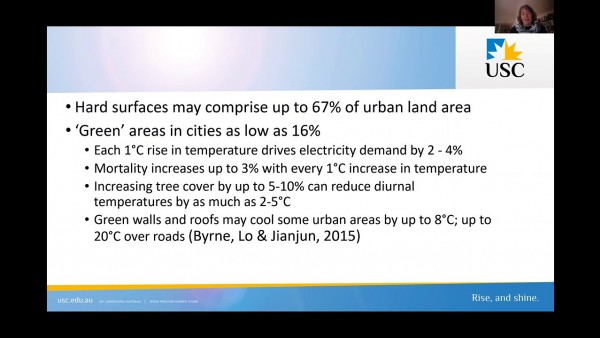Heat waves and heat stress: the role of urban greening in planning for a rapidly warming world
Climate change is expected to magnify urban heat island effects, which will affect more people with increasing urbanisation. More deaths occur in Australia from heat waves than any other natural disaster and vulnerable people (older people, children and people with disabilities) are disproportionally affected. Green infrastructure is increasingly recognised as capable of mitigating urban heat and providing other benefits, both tangible and intangible, but how do we convince decision-makers to invest in green infrastructure interventions for the long-term returns.
Prof Claudia Baldwin is the Co-director, Sustainability Research Centre at the University of the Sunshine Coast. She has taught regional and urban planning since 2006 at the University of the Sunshine Coast and is a founding members of USC’s Sustainability Research Centre. Claudia uses participatory and visual methods to research institutional and social-environmental change on topics as diverse as water allocation, coastal planning, rural and regional land use, climate change adaptation and community resilience, as well as age- and ability- friendly communities. She has published over 50 journal articles and three books.
Claudia has collaborated regionally with agencies such as Gympie Council, Maleny Neighbourhood Centre, and Noosa Biosphere Reserve; as well as internationally – with a team of researchers (from USA, Canada, UK, Thailand, and Australia) to work on social–ecological visualisation of coastal change, coordinated and funded by the National Socio-Environmental Synthesis Center at University of Maryland; and colleagues at University of Mataram, Indonesia and Jomo Kenyatta University, Kenya on water planning research. Prior to joining academia in 2006, Claudia worked for over 25 years in land-use and environmental policy and planning in Australian federal and Queensland state governments (GRMPA, Qld Premiers Dept and Qld DNRM) as well as in consulting both within Australia (NWC) and overseas (IAP2, WWF). Because of this, she is passionate about applied research and in preparing planning students for the ‘real world’.








